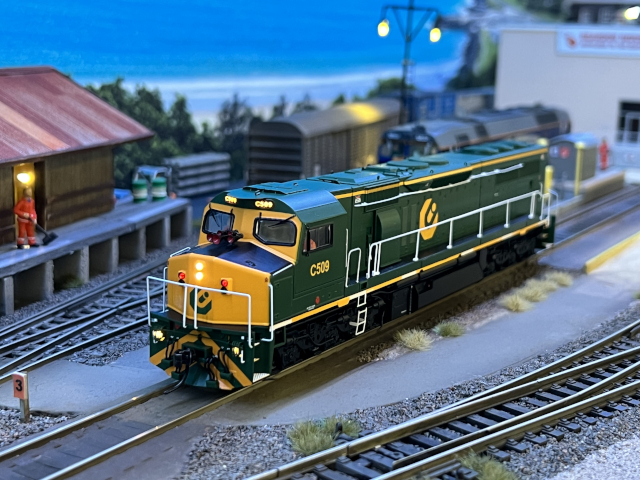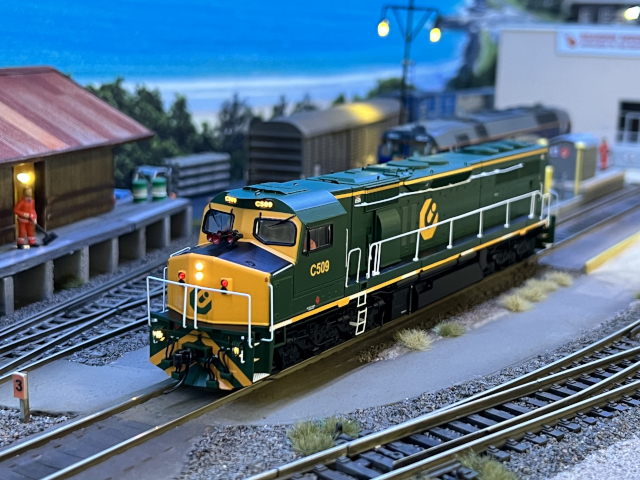There’s something new to see by the seashore on Philden Coast. And that is the new Auscision Models C Class in the Cootes Industrial Greentrains inspired green and gold livery. And crikey! Isn’t she a gorgeous sight to see?
The Auscision C Class model locomotive becomes the 7th and final acquisition for my Philden Coast Railway bookshelf layout. After years of chopping and changing as I progressed from my original Philden layout, to briefly modelling a Victorian prototype, upgrading to DCC sound and finally migrating back to the NSW North Coast, it seems that change has finally ceased.
My Coast layout’s locomotive roster now consists solely of sound equipped DCC Auscision Models locomotives circa 2000 to 2010. Once again, Auscision’s quality is hard to fault, and their model of C509 is superb. Taking it straight out of the box, I programmed it’s short address to 9 and put it through its paces without any hesitation. Here’s some pictures of it arriving in Philden Harbour Yard, starting with Rusty popping his head out of the goods shed to lean on his broom and take in the sight of the first C to appear by the seashore.
 |
| Rusty taking in the sight of C509 in Philden Harbour Yard. |
 |
| Does anyone else have a locomotive driver with a mullet in their cab? |
 |
| The no. 2 end of C509 featuring the extended hood as rebuilt in the mid 2000’s. |
The reasons for my choice of C509 in the Cootes green are simple; 1), I like the colour! 2), I photographed C509 on an SSR grain train in Moree back in 2018, and 3), it fits my everything old is new again approach to modelling, in that it is another diesel dinosaur surviving into the new Millenium dressed in some pretty cool colours.
 |
| Newly arrived C509 in the service tracks, while a newly aquired Breeze container can be seen in the no. 4 siding alongside the Brandon Industries warehouse. |
 |
| The C is a big locomotive, measuring just under 24 cm over the couplers. |
Up until the great layout revamp of January 2023, I had originally planned to get the National Rail C Class to fit into my previous inner-Melbourne yard. However, the Cootes’ C slots in right alongside my Pacific National NR and BL Class pairing, as it ran like this within NSW, hired out to both Pacific National, SSR and other private operators of the time, making it perfectly plausible to say that it was a regular on Philden Coast traffic alongside a leased CFCLA ex-NSW 422 Class.
C509 became the final model locomotive for my new layout’s hitlist. For a small 3.3 metre long bookshelf layout, I now feel that I don’t need to add anything else. Even as my wife stood beside me to admire it, she commented on how nice my collection looked, and perhaps reminded me a little that all my days of ‘selling this to afford that’ were now behind me. The C is that good, that I don’t think buying anything else is going to top the feeling of saying that my roster is now complete.
The C Class arrival actually feels like the beginning of the end to my Australian model railway journey. During the course of building 3 Australian HO scale layouts over the past 9 years, I’ve seen my share of models that I’ve liked and some that I haven’t, but I can honestly say that every model I have on this layout I love. From this point on, I only have the staging yard to convert into a scenic addition to my Harbour Yard, not a list of pre-orders or hard-to-find models to track down. It’s actually a real nice feeling!
 |
| The face on the ex-Victorian C Class dwarfs that of the ex-NSW 422 Class loco. It’s now hard to know which locomotive is my favourite. My wife claims that I say every locomotive is my favourite! |
With my latest book Model Railway Backdrop Basics now being promoted and available in stores, this week I will complete the next book that I have been busy working on for the past year, Model Railway Weathered Wonders. Beyond that, in the coming month I will sit down to start writing my final Philden Model Railway Presents book, the title of which is still to be decided. It will likely be an extended book to cover indepth everything that I’ve shared about changing this layout into its current setting, and likely cover subjects that I haven’t brushed on in any of my other books such as; track planning, assembling a roster, operations, starting over and even a bit of model railway psychology. I know that once I start writing this book that my Australian model railway journey will come to an end, and I’ll have a layout that I can be proud of. I now want to simply stand back and enjoy operating Philden Coast for years to come.
 |
| And heading north out of Harbour Yard beneath the Philden Street overpass. |
So… finally, the C Class trots off into staging to get to work shunting some newly arrived van traffic ex-Sydney. These will be positioned in the no. 1 and no. 4 sidings at Brandon Industries, and the loaded refrigerated containers of fresh seafood will be swapped back into place in staging waiting to be added to a Sydney-bound overnight freight. It’s all in a day’s work, (or in this case a 45 minute mid-week operating session in my lounge room), on the Philden Coast Railway. It’s the kind of modelling that I set out to enjoy… and am finally able to do.
Until next time…









